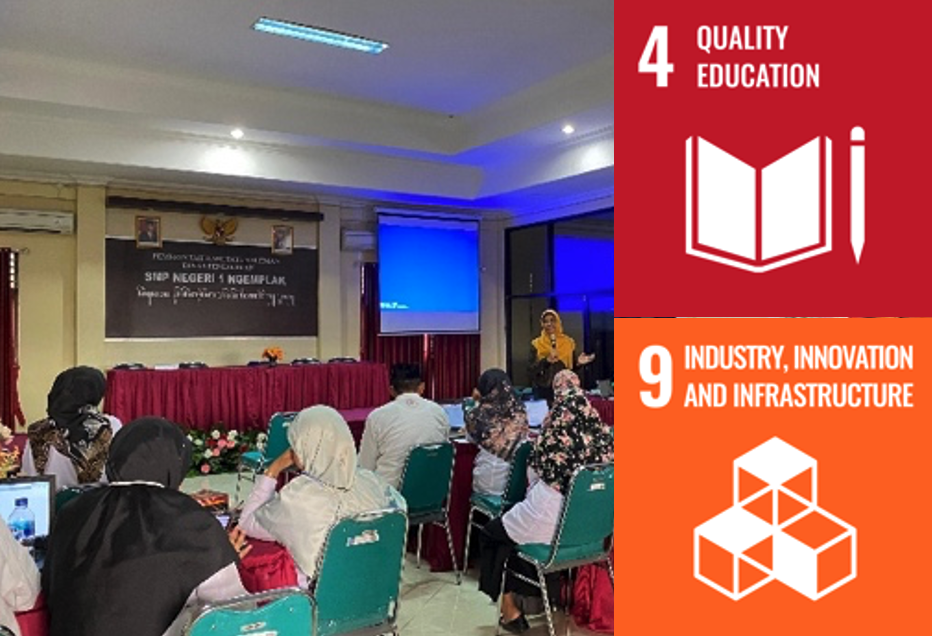Main Article Content
Abstract
The latest technological advancements that significantly impact human life today include Artificial Intelligence (AI). To support the learning process in the classroom, teachers' ability to utilize digital media is a crucial factor. This community service program aims to enhance teachers' skills in leveraging AI for the development of learning media. The methods used in this program include workshops, training, and mentoring. Evaluation results indicate that teachers have gained knowledge about the functions and benefits of various AI tools, such as ChatGPT, Gamma App, and Canva, in developing learning media. Furthermore, 77% of teachers stated that the program was highly beneficial, and 90% expressed high satisfaction with the educational program conducted.
Keywords
Article Details

This work is licensed under a Creative Commons Attribution-NonCommercial 4.0 International License.
References
- Abdulmunem, R. A. (2023). Artificial Intelligence in Education. In Comparative Research on Diversity in Virtual Learning: Eastern vs. Western Perspectives (pp. 241–255). https://doi.org/10.4018/978-1-6684-3595-3.ch012
- Alam, A., & Mohanty, A. (2023). Facial Analytics or Virtual Avatars: Competencies and Design Considerations for Student-Teacher Interaction in AI-Powered Online Education for Effective Classroom Engagement. In Communications in Computer and Information Science (pp. 252–265). https://doi.org/10.1007/978-3-031-43145-6_21
- Bhardwaj, K., Garima, & Sudan, S. (2024). Artificial Intelligence’s Role and Future Implementation in Education. In AI-Enhanced Teaching Methods (pp. 160–175). https://doi.org/10.4018/979-8-3693-2728-9.ch007
- Chassignol, M., Khoroshavin, A., Klimova, A., & Bilyatdinova, A. (2018). Artificial Intelligence trends in education: A narrative overview. Procedia Computer Science, 136, 16–24. https://doi.org/10.1016/j.procs.2018.08.233
- Dayal, G., Verma, P., & Sehgal, S. (2023). A Comprehensive Review on the Integration of Artificial Intelligence in the Field of Education. In Leveraging AI and Emotional Intelligence in Contemporary Business Organizations (pp. 331–349). https://doi.org/10.4018/979-8-3693-1902-4.ch020
- Goralski, M. A., & Tan, T. K. (2020). Artificial intelligence and sustainable development. International Journal of Management Education, 18(1). https://doi.org/10.1016/j.ijme.2019.100330
- Holmes, W., Bialik, M., & Fadel, C. (2019). Artificial intelligence in education: Promises and implications for teaching and learning. The Center for Curriculum Redesign, Boston, MA (Vol. 14, Issue 4). Center for Curriculum Redesign.
- Ketak, R., Mittal, S., Gupta, V., & Gupta, H. (2024). Online Edtech Platform with AI Doubt Assistance. 2024 2nd International Conference on Disruptive Technologies (ICDT), 1395–1399. https://doi.org/10.1109/ICDT61202.2024.10489310
- Kollar, J., & Alshibli, M. (2024). An Overview of Artificial Intelligence’s Accuracy. 2024 IEEE Long Island Systems, Applications and Technology Conference (LISAT), 1–8. https://doi.org/10.1109/LISAT63094.2024.10808042
- Makarenko, O., Borysenko, O., Horokhivska, T., Kozub, V., & Yaremenko, D. (2024). Embracing Artificial Intelligence in Education: Shaping the Learning Path for Future Professionals. Multidisciplinary Science Journal, 6, 2024ss0720. https://doi.org/10.31893/multiscience.2024ss0720
- Nirwana, & Puspa, A. R. (2020). Kemampuan menulis karya tulis ilmiah mahasiswa prodi Informatika Universitas Cokroaminoto Palopo. Jurnal ONOMA: Pendidikan, Bahasa Dan Sastra, 6(1). https://doi.org/https://doi.org/10.30605/onoma.v6i1.277
- Osamor, A., Ifelebuegu, Kulume, P., & Cherukut, P. (2023). Chatbots and AI in Education (AIEd) Tools: The Good, the Bad, and the Ugly. Journal of Applied Learning & Teaching, 6(2). https://doi.org/10.37074/jalt.2023.6.2.29
- Qian, Z. (2021). Applications, Risks and Countermeasures of Artificial Intelligence in Education. 2021 2nd International Conference on Artificial Intelligence and Education (ICAIE), 89–92. https://doi.org/10.1109/ICAIE53562.2021.00026
- Ririh, K. R., Laili, N., Wicaksono, A., & Tsurayya, S. (2020). Studi Komparasi dan Analisis Swot Pada Implementasi Kecerdasan Buatan (Artificial Intelligence) di Indonesia. Jurnal Teknik Industri, 15(2), 122–133.
- Santos, V., Mamede, H., Silveira, C., & Reis, L. (2023). A Reference Model for Artificial Intelligence Techniques in Stimulating Reasoning, and Cognitive and Motor Development. Procedia Computer Science, 219, 1057–1066. https://doi.org/10.1016/j.procs.2023.01.384
- Satpute, R. S. (2023). Transforming the Language Teaching Experience in the Age of AI. In Transforming the Language Teaching Experience in the Age of AI (pp. 115–124). https://doi.org/10.4018/978-1-6684-9893-4.ch007
- Sethi, A., Gupta, T., Ranjan, R., Srivastava, V., & Bhole, G. V. (2024). Artificial Intelligence in Healthcare and Medicine. In Lecture Notes in Electrical Engineering (pp. 397–403). https://doi.org/10.1007/978-981-99-7954-7_36
- Shank, D. B., & Gott, A. (2019). People’s self-reported encounters of Perceiving Mind in Artificial Intelligence. Data in Brief, 25(5), 104220. https://doi.org/10.1016/j.dib.2019.104220
- Sousa, W. G. de, Melo, E. R. P. de, Bermejo, P. H. D. S., Farias, R. A. S., & Gomes, A. O. (2019). How and where is artificial intelligence in the public sector going? A literature review and research agenda. Government Information Quarterly, 36(4), 101392. https://doi.org/10.1016/j.giq.2019.07.004
- Tournas, L. N., & Bowman, D. M. (2021). AI Insurance: Risk Management 2.0. IEEE Technology and Society Magazine, 40(4), 52–56. https://doi.org/10.1109/MTS.2021.3123750
- Vrcelj, S., Kušić, S., & Mrnjaus, K. (2023). Artificial Intelligence and Education: Rivals or Allies? JAHR, 14(2), 429–445. https://doi.org/10.21860/j.14.2.9
- Zahara, S. L., Azkia, Z. U., & Chusni, M. M. (2023). Implementasi Teknologi Artificial Intelligence (AI) dalam Bidang Pendidikan. Jurnal Penelitian Sains Dan Pendidikan (JPSP), 3(1), 15–20. https://doi.org/10.23971/jpsp.v3i1.4022

